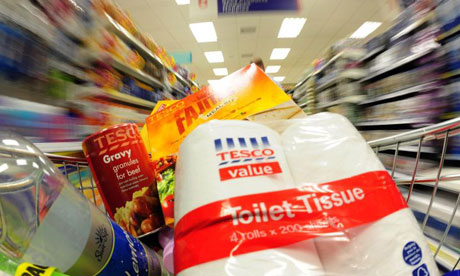
December 11, 2012
Tesco is no champion of the poor
Forget the eulogies to Sir Terry Leahy. The legacy of Leahyism has been damage to our towns, countryside and environment, and the promotion of a much poorer diet that we'll all pay for
The supermarket may have halved the price of much of our food, but at what cost? Photograph: Reuters
Sir Terry Leahy is retiring as head of Tesco after 14 years, "to spend more time with his private investments", according to yesterday's Guardian. He got the sort of press that'll make a nice decorative feature in his downstairs loo. He is one of the "10 people who have most helped the poor in recent decades," said the Tory blogger Tim Montgomerie in a Times piece, straplined 'champion of the poor'. "Every little he did helped us," said The Sun. "The outstanding businessman of the decade," saidthe Mail.
Do these people get out at all? They could visit one of the towns in Britain, such as Inverness, where three in every £4 is spent in a Tesco store; take a walk down the high streets reduced to a pathetic straggle of charity shops and tanning parlours. Then Leahy's fans might begin to see why another part of the population - among them farmers, small business people and independent shop owners - don't think Sir Terry helped at all.
Any food lover who thinks further than the rumble in their stomach should join in bidding good riddance to a rich man who's left far behind the Tesco shelf-stackers and floor cleaners from among whom - as the glowing eulogies all tell us - he rose so magnificently. I'd say Sir Terry has done more damage to the fabric of British life than any other businessman in modern times. The papers expect to see him helping out David Cameron and Nick Clegg very soon indeed.
Joanna Blythman, the writer who has been chronicling the retail trade since Sir Terry was starting out in the Tesco boardroom, told me: "I hold him responsible for grave damage to our world and our country. He has a large share of responsibility for the blight of our high streets, for the collapse of the agricultural economy. I think Terry Leahy has been a disaster – he's the face of a phenomenon that has diminished the quality of life of everyone in Britain. The supermarkets devalued our food. He's made us fatter and enjoy food less."
The list of crimes that can be laid at Tesco and its rivals' doorstep is a long one. For me, chief among them is the fact that the giants have used their power and money to convince governments for decades to keep their hands off the industry. Endless scandals - on the land grabbing, the price-fixing, the breaching of planning law, the shameless misleading of millions of customers into grabbing illusory bargains - show just how wrong that policy was.
Our food policy? 'Leave it to Tesco' seems to have been the view of ministers since the 80s. Labour saw no reason to change that. Now Tesco makes over £3bn profit a year, our food supply structure is under threat and we're all paying.
Having investigated the farm-gate price crises in milk and eggs forObserver Food Monthly and others, I know how powerful Tesco and its clones are. Even through the National Farmers Union, their suppliers are generally too scared to talk to journalists - even anonymously - about the problems they face in negotiating with the Big Boxes. But what you discover is that they are not seeing anything like a fair share of those amazing profits.
Now, on a whole range of staples from dairy to bacon, two-thirds of British farmers can no longer make a sustainable living - according to the government's own figures. One example: the supermarkets' profit on a pint of milk is double what it was 10 years ago, and British dairy farmers have been going out of business at the rate of one a day for the last two years.
The core of Leahyism, and its "brilliance", was the relentless forcing down of prices: "value" as the primary marketing tool. That became the chief strategy of all the supermarket chains. Yes, it made food cheaper. There's no doubting that - most households in Britain now spend nearly half, as a proportion of income, what they did 30 years ago. But this notion of the philanthropic Tesco, of St Terry who fed the poor so generously, is nauseating rubbish.
Tesco and the other chains lowered prices because they never paid the real costs of what they sold. And many of us who were not so poor saved on food to finance more foreign holidays, new TVs and more shoes - many of which Tesco could now provide. The expense of that shift has to be counted in terms of damage to our towns and countryside, grotesque cruelty to farm animals, environmental damage and the enormous waste a cheap food system creates. And, of course, the health of our children. We cannot turn the clock back: a million farmers' markets or supermarket ombudsmen will never undo the damage.
I've written enough about this here in the past to know that many of you think that one good - namely lower prices - is worth all the harm. If you oppose Tesco - even when they're opening the third store in your town - you're a rich snob. Their PR team is brilliant and relentless, as every writer on food policy knows. But the increasing numbers of people who are making an effort to abandon the supermarkets know something no marketing guff will ever cover up: they sold us a pup.
http://www.guardian.co.uk/lifeandstyle/wordofmouth/2010/jun/10/tesco-terry-leahy-supermarkets



















